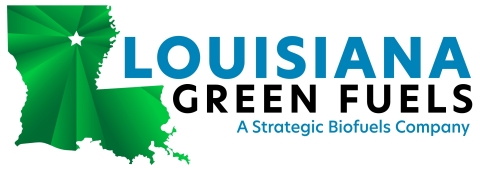COLUMBIA, La.--(BUSINESS WIRE)--Strategic Biofuels LLC, the leader in developing negative carbon footprint renewable fuels plants, announced today that its Carbon Capture and Sequestration (CCS) Test Well Program was successfully completed at the company’s Louisiana Green Fuels Project (LGF) in Caldwell Parish, Louisiana. LGF is the first renewable diesel fuel project to achieve this milestone.
The goals of the test well program were to demonstrate that carbon dioxide (CO2), the main greenhouse gas generated during the fuel production process, can be safely and securely stored deep underground and that the storage reservoir has sufficient capacity to store all the gas produced over the plant’s lifetime. Completing the test well program is an essential pre-requisite for securing the permit for the EPA Class VI sequestration well.
“Carbon capture and permanent geologic sequestration is no longer a hypothetical scenario for Louisiana Green Fuels — successful completion of the test well is a major milestone that’s not been achieved by any other renewable diesel project,” said Dr. Paul Schubert, Chief Executive Officer of Strategic Biofuels. “These results enable us to move forward knowing that combining CCS with conversion of sustainable forestry waste to renewable diesel at our project site will enable us to achieve our deeply negative carbon footprint goal. Deep carbon negativity greatly increases the potential carbon credit revenues from our fuel and vastly improves the project’s returns. What’s set us apart from other developers was recognizing that the de-risking we could achieve with the test well more than justified the multi-million-dollar expenditure for the program at this early stage.”
The design and execution of the test well program was developed by Chief Operating Officer Bob Meredith with help from Geostock Sandia, an international consulting firm that has worked with the Department of Energy on carbon sequestration wells for almost two decades. Notably the program used oil field workers and traditional oilfield equipment to advance this green energy project.
Engineering phase next for LGF
Strategic Biofuels is now moving into a phase of engineering design for the plant that will give even greater clarity on the overall, long-term costs of the project, while also applying for the required regulatory permits and putting third party contracts in place.
“It’s easy to get excited about what the success of this sequestration test well means to the economic development for Caldwell Parish and the State of Louisiana, but we still have a lot of work to do entering an aggressive capital raise,” added Meredith. “What we have been able to accomplish could very well be a blueprint for the renewable energy industry that is working to address our country’s carbon footprint far into the future.”
Although the data collection from the CCS test well is done, it will remain in place as a monitoring well once the plant is complete and carbon dioxide injection begins in its Class VI well. The current project schedule is for the plant to be mechanically complete in mid-2025 and achieve full commercial operation in late 2025.
The first carbon negative plant demonstrating circular economy tenets
Located on a 171-acre site at the Port of Columbia, the LGF plant will affordably convert forestry waste feedstock into cleaner-burning renewable diesel and is projected to produce 33.7 million gallons of renewable fuel per year once in operation.
LGF has secured a 20-year agreement with an established, bankable feedstock supplier for delivery of compliant feedstock to the plant, ensuring long-term and cost-effective supply. The waste material will be in-woods processed and delivered as sized chips. The cleaner, renewable fuels produced at the plant will be transported to California by rail for one of the largest truck stop operators in the country through a 20-year offtake agreement, which includes purchase of all the site’s Federal (RFS) and California (LCFS) carbon credits. These agreements provide financial stability for the plant, while demonstrating a circular economy cycle often not achieved due to lack of scalability.
Just like synthetic motor oil is superior to traditional motor oil, LGF’s synthetic renewable diesel will be superior to both fossil diesel and biodiesel. If used unblended it would dramatically reduce engine emissions by up to 80 percent including the smoke and soot which are normally associated with fossil diesel. Not only is it cleaner burning, it is also non-toxic and biodegradable.
Led by a strong management team with invaluable experience
The management team that Schubert has put together has set them up for early success. Schubert has 35 years of experience in the petrochemical and renewable fuels industry and was formally COO of Velocys, an international sustainable fuels company. Meredith has almost 50 years of experience in the oil and gas industry. The Company’s other team members, Victor Filatov (CFO), Dr. Robert Freerks (VP Products), and Paul Oesterreich (VP Sales & Marketing) have long track records of success in the renewable energy industry and bring expertise in renewable energy project finance, carbon credit and fuel marketing and fuel quality development.
About Strategic Biofuels
Strategic Biofuels LLC is a team of O&G, petrochemical and renewable technology gurus focused on developing a series of deeply negative carbon footprint plants in northern Louisiana that convert waste materials from managed forests into renewable diesel fuel and renewable naphtha. The fuel qualifies for substantial Carbon Credits under the Federal Renewable Fuel Standard Program (RFS) and under the California Low Carbon Fuels Standard (LCFS).
About Louisiana Green Fuels
Louisiana Green Fuels (LGF) is the first project by Strategic Biofuels LLC in Northern Louisiana at the Port of Columbia in Caldwell Parish. The plant and its accompanying Class VI Carbon Capture and Sequestration Well will be the first renewable diesel project in North America to achieve “negative” carbon emissions. The feedstock for the plant is forestry waste from managed and sustainable forests.





